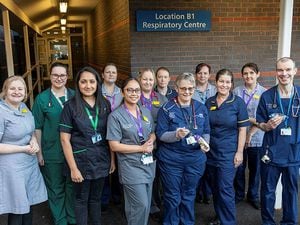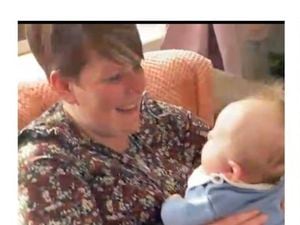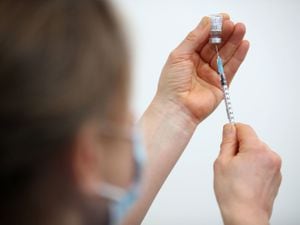Device being trialled on Wolverhampton patients could save up to 500 bed days a year
A device being trialled to patients in Wolverhampton with certain infections could keep them out of hospital, saving up to 500 bed days a year.

For the next three months, 20 patients treated at New Cross Hospital for bronchiectasis – a long-term condition where the airways become widened – will use machines the size of a small drinks can to administer their IV antibiotics for up to 24 hours.
These patients have a build-up of excess mucus that can make the lungs more vulnerable to infection.
Common symptoms are coughing, shortness of breath and chest infections.
The devices will provide the Respiratory Centre at The Royal Wolverhampton NHS Trust (RWT) with another way to either avoid admission, or help to discharge people who need a prolonged course of IV antibiotics but who otherwise don’t need to be in hospital.
Nicky MacDuff, nurse consultant at the Respiratory Centre (RWT), said: “This trial will hopefully reap many benefits in terms of patient flow and freeing up beds.
“This will also significantly reduce community nursing time and allow an increased number of patients to be eligible for treatment at home.
“Based on 2019 data, we estimate this could save in the region of 500 bed days per year. If this could be rolled out beyond the Respiratory Centre, the number of patients who could be treated at home could increase more rapidly.”
Fitted in hospital to patients or by community nurses in their homes – called outpatient parenteral antimicrobial treatment (OPAT) – the devices are kept in the fridge before being attached, normally via a vein in the crook of the arm.
This should also prove popular with patients and their families, as patients can place the machine in a carrying pouch, then go about their daily business – including showering and sleeping – all in the comfort of their own home.
But users are encouraged to use progress charts supplied to them so they can follow the progress of their infusions and inform staff of any issues.
Hexagonal-shaped to prevent it rolling off a table, the device can dispense medication at hourly rates of 100 millilitres or 200mls.
Global suppliers Baxter International supply sharps bins for disposal but is looking at ways of recycling the devices in the future.
Already being used in more than 60 UK hospitals, patients report they “don’t realise the devices are there” and that they have “got their lives back”.
Training for staff started on January 12 and the trial has now gone live.
Nicky added: “The respiratory multi-disciplinary team (MDT) has worked hard to get this off the ground and we’re very grateful for the support of Debbie Houliston, group manager, Kelly Crutchley, senior matron, and consultants Dr Carter, clinical director, and Dr Thickett.
“In addition, Matt Reid, head of nursing – corporate support services, has provided much-needed advice, as well as access to ICNet (clinical surveillance software for infection prevention and control) to facilitate early identification of eligible patients.”
Kiran Salhan, lead clinical pharmacist for respiratory medicine at RWT, said: “These pumps will change the way we treat patients with bronchiectasis at home.
“This way of delivering intravenous antibiotics gives the patient the freedom and opportunity to get better within their own environment while receiving critical treatment.
“It’s so important we can work treatments around the patient, and introducing this forward-thinking approach has really given us the opportunity to do that.
“The contribution it will have to the flow of patients through the hospital will mean more beds are available, helping to relieve the pressure on the NHS.”





